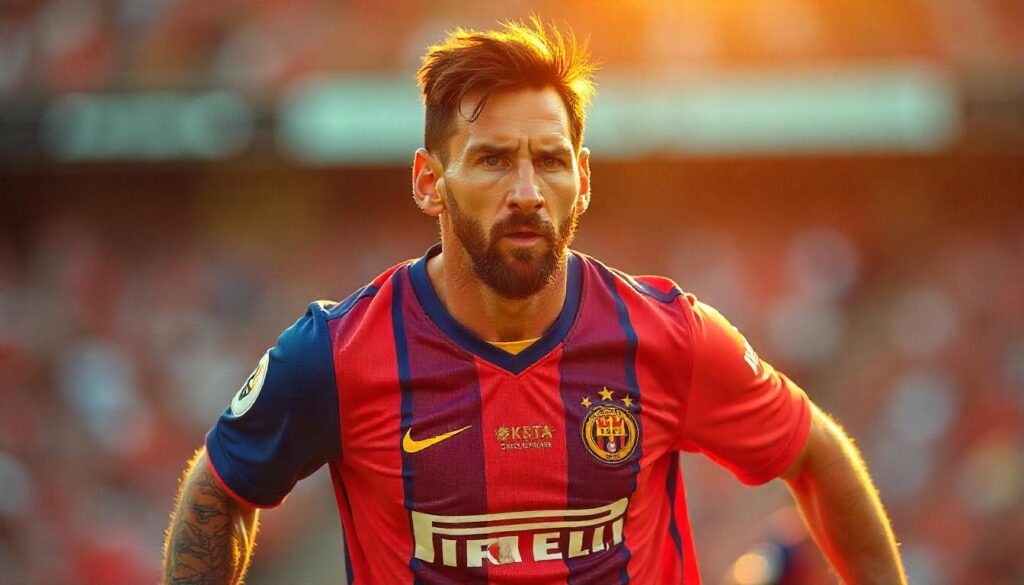Lionel Messi is widely regarded as one of the greatest footballers of all time. Born on June 24, 1987, in Rosario, Argentina, Messi’s journey from a young boy with growth hormone deficiency to a global football icon is a story of extraordinary talent, relentless dedication, and unyielding passion for the beautiful game.
Early Life and Challenges
Messi’s love for football began at a very young age. His natural ability was evident early on, but his path was not without obstacles. At just 10 years old, Messi was diagnosed with a growth hormone deficiency, a condition that threatened to halt his dreams of becoming a professional athlete. His family struggled to afford the costly treatment, and local clubs hesitated to take a chance on a boy with health concerns.
Everything changed when FC Barcelona came calling. The club offered to pay for Messi’s medical treatment and brought him to Spain, where he joined La Masia, Barcelona’s famed youth academy. This move marked the beginning of a legendary career.
Rise to Stardom at Barcelona
Messi quickly rose through the ranks at Barcelona, dazzling coaches and fans alike with his exceptional skill, vision, and goal-scoring prowess. His style of play is characterized by his low center of gravity, incredible dribbling ability, quick acceleration, and precise finishing. Messi’s ability to glide past defenders with ease and his uncanny knack for finding the back of the net made him a standout player.
He made his first-team debut in 2004 at just 17 years old. Over the next decade and a half, Messi would become the face of Barcelona, leading the club to numerous victories. He won multiple La Liga titles, Copa del Rey trophies, and UEFA Champions League titles. Messi’s records at Barcelona are staggering—he is the club’s all-time top scorer, with over 600 goals in official competitions.
Style of Play and Skills
What makes Messi truly special is his unique blend of creativity and effectiveness. Unlike many goal-scoring forwards who rely on brute strength or height, Messi uses agility, balance, and intelligence. He reads the game at an extraordinary level, often anticipating the moves of defenders and goalkeepers before they happen.
His dribbling style is mesmerizing: he keeps the ball close to his feet and uses sudden changes of direction to evade opponents. This skill has earned him the nickname “La Pulga,” meaning “The Flea,” due to his small stature and ability to slip through tight spaces.
Messi is also an outstanding playmaker. His vision allows him to deliver pinpoint passes and assists, setting up teammates for goals as often as he scores himself. This dual threat makes him a complete forward and a nightmare for opposing defenses.
International Career
Despite his success at the club level, Messi’s international career with Argentina has been a rollercoaster of highs and lows. Early on, critics accused him of underperforming for his national team, especially in major tournaments like the FIFA World Cup and Copa América. However, Messi’s commitment to his country never wavered.
In 2021, Messi achieved a major milestone by leading Argentina to victory in the Copa América, his first major international trophy. This win was hugely emotional for Messi and his fans, as it cemented his legacy as not just a club legend but also a national hero.
Move to Paris Saint-Germain
In 2021, after more than 20 years at Barcelona, Messi faced an unexpected and emotional departure. Financial difficulties forced Barcelona to part ways with their star player. Messi then signed with Paris Saint-Germain (PSG), marking the beginning of a new chapter in his career.
At PSG, Messi has continued to showcase his incredible talents, adapting to a new league and teammates. His presence has elevated the team’s profile and competitiveness in both domestic and European competitions.
Legacy and Impact
Lionel Messi’s influence extends beyond the pitch. He has inspired millions of young players worldwide to pursue their dreams, regardless of obstacles. Messi’s humility, dedication, and sportsmanship have earned him respect from fans, fellow athletes, and critics alike.
He has won the prestigious Ballon d’Or award multiple times, a testament to his status as the world’s best player over many years. Messi’s records for goals, assists, and appearances speak volumes about his consistency and longevity.
Off the field, Messi is known for his charitable work. Through the Leo Messi Foundation, he supports education, health care, and sports programs for children in need, reflecting his commitment to giving back to society.
Conclusion
Lionel Messi’s story is one of extraordinary talent matched by hard work and perseverance. From a small boy in Argentina to the summit of world football, he has redefined what it means to be a footballer. His skills, achievements, and character make him a true legend of the game.
As Messi continues to write new chapters in his career, fans around the world remain captivated by his artistry on the field. He is more than just a player; he is an inspiration, a symbol of hope, and a living legend whose impact will be felt for generations to come.


